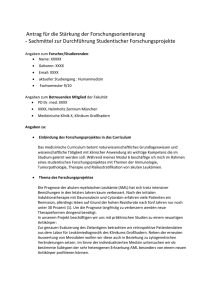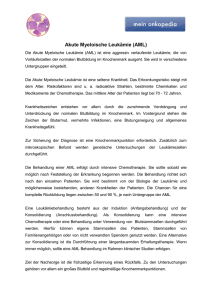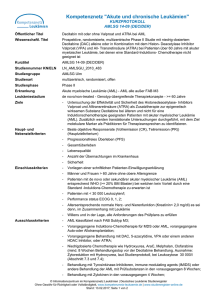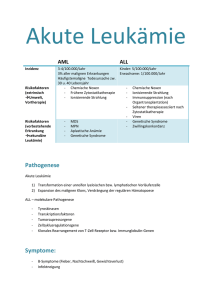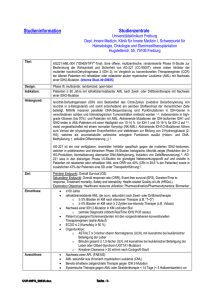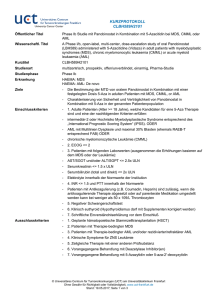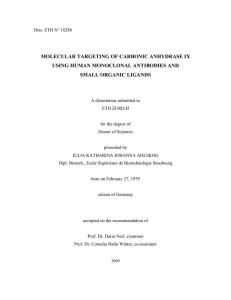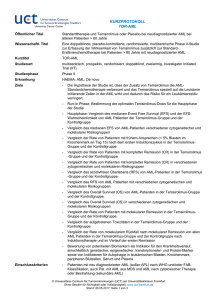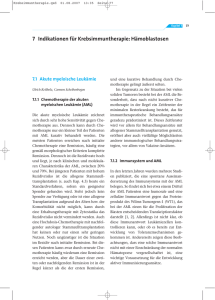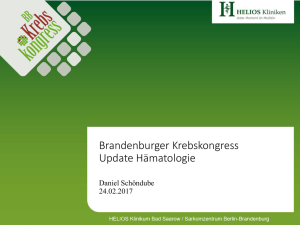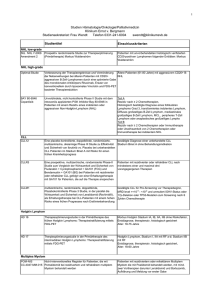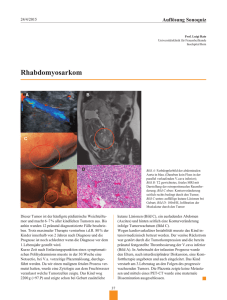armed vascular targeting antibodies for the - ETH E
Werbung
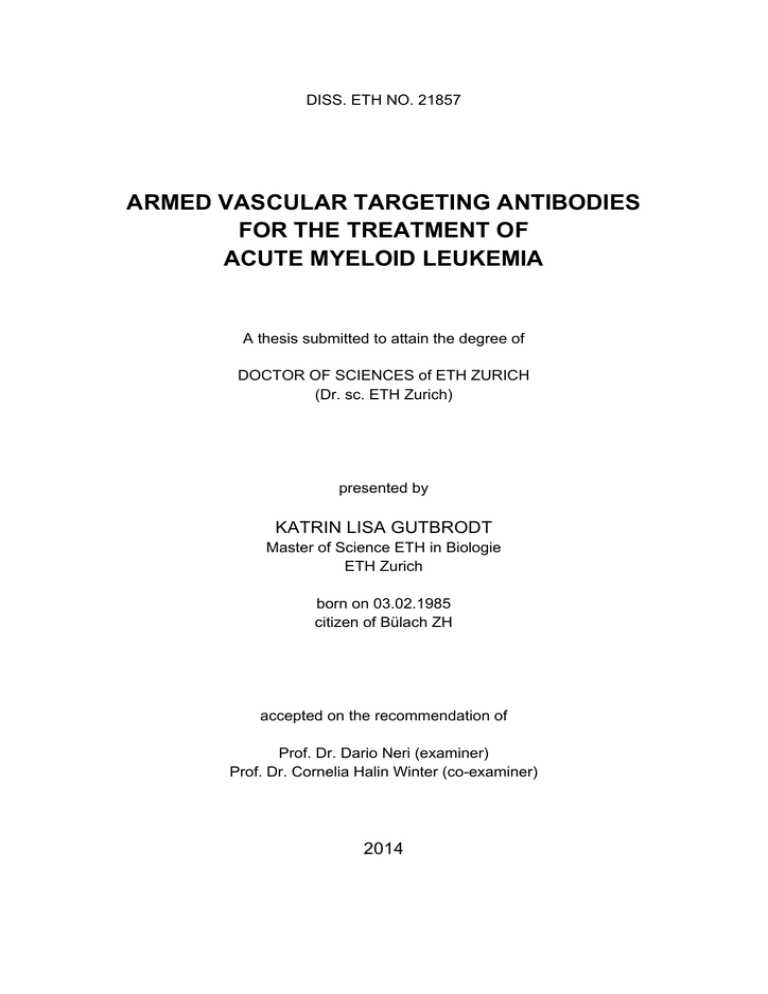
DISS. ETH NO. 21857 ARMED VASCULAR TARGETING ANTIBODIES FOR THE TREATMENT OF ACUTE MYELOID LEUKEMIA A thesis submitted to attain the degree of DOCTOR OF SCIENCES of ETH ZURICH (Dr. sc. ETH Zurich) presented by KATRIN LISA GUTBRODT Master of Science ETH in Biologie ETH Zurich born on 03.02.1985 citizen of Bülach ZH accepted on the recommendation of Prof. Dr. Dario Neri (examiner) Prof. Dr. Cornelia Halin Winter (co-examiner) 2014 ! ! 1. Summary “Arming” antibodies with potent payloads (e.g cytotoxic drugs and cytokines), in order to increase activity at the site of disease and spare normal tissues, represents an attractive strategy of emerging importance in the field of cancer therapeutics. The growth and progression of solid cancers depends on the formation of new blood vessels, which provide accessible and selective targets for antibody-mediated pharmacodelivery. Indeed, antibodies directed against neo-vascular antigens have shown selective tumor localization and potent antitumor activity as antibody-cytokine fusion proteins (immunocytokines), allowing these products to progress to phase II clinical trials for the treatment of solid cancers. Recent findings suggest, that these antibody products may also be applicable for the treatment of hematological cancers, such as Acute Myeloid Leukemia (AML). In this thesis, we analyze biopsies of AML and Acute Lymphoid Leukemia (ALL) patients with the clinical-stage human monoclonal antibodies F8, L19 and F16, directed against markers of tumor angiogenesis. The analysis revealed that the F8 and F16 antibodies strongly stained 70% of AML and 75% of ALL bone marrow specimens, while chloroma biopsies were stained with all three antibodies. The immunocytokine F8-IL2 (the F8 antibody fused to human interleukin-2) promoted significant tumor inhibition in immunocompromised mice bearing human leukemia and promoted complete tumor eradication in combination with cytarabine in 40% of the treated animals. Immunocompetent mice bearing murine leukemia revealed long-lasting complete tumor eradication ! #! ! after combination treatment in all mice. We showed that the therapeutic effect of F8-IL2 was mediated by natural killer (NK) cells and CD8+ T cells, while CD4+ T cells appeared to be dispensable. The treatment of an AML patient with disseminated extramedullary AML manifestations with F16-IL2 (the F16 antibody fused to human interleukin-2) and low-dose cytarabine resulted in significant reduction of AML lesions, demonstrating the translational potential of IL2-based vascular targeting immunocytokines for the treatment of patients with leukemia. Combining IL2-based immunocytokines with chemotherapeutics has repeatedly shown to promote potent antitumor activity. However, cytotoxic agents often lack selectivity. Antibody-drug conjugates (ADCs) are increasingly being used for cancer therapy, with the aim to concentrate chemotherapeutic drugs at the neoplastic site. So far, ADCs have not been studied in combination with immunocytokines and little is known about their ability to engage in anticancer immune responses. We found that both F8-IL2 and F8-S-CH2-Cem (the F8 antibody conjugated to the potent cytotoxic drug cemadotin) had single-agent activity in the immunocompetent AML mouse model. Complete tumor eradications were obtained when combining the armed antibodies, in a process dependent on NK cells and CD8+ T cells. The cured mice were challenged with subsequent injections of tumor cells, but did not develop neoplastic lesions, indicating that the combination treatment had conferred animals with protective immunity. ! $! ! 2. Zusammenfassung Das “bewaffnen” von Antikörpern mit potenten Wirkstoffen (wie z.B. zytotoxische Substanzen oder Zytokine) ist ein attraktiver und bedeutender Ansatz für die Entwicklung von neuen Krebsmedikamenten, mit dem Ziel die therapeutische Wirkung im erkrankten Gewebe zu stärken und die Belastung des gesunden Gewebes zu reduzieren. Das Wachstum von soliden Tumoren ist auf die Bildung neuer Blutgefässen angewiesen. Durch die Neoangiogenese entstehen gut zugängliche und selektive Antigene, welche Antikörper-basierte zielgerichtete Anreicherung von Wirkstoffen im Tumor ermöglichen. Antikörper gegen neo-vaskuläre Antigene zeigen eine selektive Anreicherung im Tumor auf und erzielen potente anti-tumor Aktivität als Immunozytokine (Antikörper-Zytokin Fusionsproteine), welche nun in Phase II klinischen Studien zur Behandlung von soliden Tumoren untersucht werden. Kürzlich erschienene Forschungsergebnisse weisen darauf hin, dass diese Produkte auch zur Behandlung von hämatologischen Krebserkrankungen wie Akute Myeloische Leukämie (AML) angewendet werden könnten. In dieser Arbeit analysierten wir Biopsien von AML und Akuter Lymphatischer Leukämie (ALL) Patienten mit den klinisch relevanten humanen Antikörpern F8, L19 und F16, welche gegen Marker von Tumor Blutgefässe gerichtet sind. Die Analyse hat gezeigt, dass F8 und F16 Strukturen in 70% der AML und 75% der ALL Knochenmarkbiopsien erkannten, während Chloroma Biopsien mit allen drei Antikörpern reagierten. Das Immunozytokin F8-IL2 (Fusion des F8 Antikörpers mit humanem Interleukin-2) verlangsamte das Tumorwachstum in immunkomprimierten Mäusen mit humaner AML. Der Effekt wurde durch eine Kombination mit ! %! ! Cytarabin verstärkt und förderte die vollständige Heilung in 40% der Tiere. In immunkompetenten Mäusen mit muriner AML führte diese Kombinationstherapie sogar zu langanhaltender Heilung aller Tiere. Wir zeigten, dass die therapeutische Aktivität von F8-IL2 von natürlichen Killerzellen (NK-Zellen) und CD8+ T-Zellen, aber nicht von CD4+ T-Zellen, vermittelt wurde. In einem AML Patient mit disseminierten extramedullären AML-Manifestationen konnte mit F16-IL2 (Fusion des F16 Antikörpers mit humanem Interleukin-2) und niedrig dosiertem Cytarabin eine beeindruckende Reduktion der AML-Läsionen erreicht werden. Die Kombination von IL2-basierten Immunozytokinen und Chemotherapeutika zeigte wiederholt wirkungsvolle anti-tumor Effekte. Chemotherapeutische Wirkstoffe sind jedoch in der Regel nicht selektiv und fördern Nebenwirkungen. Daher wurde in den letzten Jahren stark auf die bewaffneten Antikörper „Antibody-drug conjugates“ (ADCs) gesetzt, um cytotoxische Substanzen zielgerichtet zum Tumor zu bringen. Bisher wurden ADCs noch nicht in Kombination mit Immunozytokinen getestet und ihre Fähigkeit sich an anti-tumor Immunantworten zu beteiligen ist unbekannt. Wir haben gezeigt, dass sowohl F8-IL2, wie auch F8-SS-CH2Cem (cytotoxisches Cemadotin gekoppelt an den F8 Antikörper) als Einzeltherapie im immunkompetenten AML Modell aktiv waren. Die gänzliche Eradikation von Tumoren erreichten jedoch nur beide Antikörperprodukte in Kombination. Dieser Prozess war abhängig von NK-Zellen wie auch CD8+ T-Zellen und die geheilten Mäuse zeigten eine schützende Immunität gegen wiederholtes injizieren von Tumorzellen. ! &!
